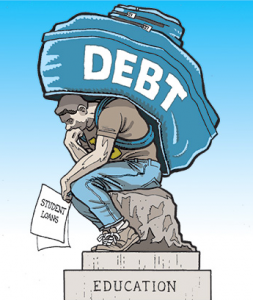April 4, 2022
 You must act responsibly when you reach adulthood. There are numerous problems in student life, and it is important to manage one’s finances. Many students get burdened by excessive bills and school loans, and as a result, they suffer from a variety of physical and mental health issues.
You must act responsibly when you reach adulthood. There are numerous problems in student life, and it is important to manage one’s finances. Many students get burdened by excessive bills and school loans, and as a result, they suffer from a variety of physical and mental health issues.
Such problems can only be overcome if you are properly guided. Be aware of the key elements that will assist you in achieving financial freedom. You may have read several articles written by an expert essay writer to provide you with useful advice, but here are some of the most effective and practical strategies for dealing with such problems.
5 Best Tips to Solve the Financial Issues in Your College Life
Have a look at some of the quickest and most useful tips to get rid of any financial issue you might be facing during college life:
1. Make a Careful Budget Plan
You should make a budget plan that has been designed by understanding all your requirements. Being conscious about your weekly or monthly expenses saves you from a lot of crises. It is the smartest way to keep your finances in check and you can then balance life accordingly.
Instead of spending your money on extravagant events and activities, try to make investments at essentials. It does not mean giving up on what you enjoy doing but do not make it a habit of wasting money on lots of such activities. The plans you make in your early years affect your life later so think wisely before you decide to make investments.
2. Be Financially Literate
Being aware of the benefits of saving money for the future is equally as vital as the formal education you acquire in your subject of interest. When you follow efficient money habits, you live a well-planned life and hardly face any difficulties. You start developing strategies to have more than one source of income to remain financially stable.
It trains you to remain alert for any kind of risky circumstances and save money accordingly. Not every student is born with the privilege to have financial support from family and some have to struggle hard to keep up with their needs. Therefore, financial literacy is an absolute must to live a balanced life.
3. Get a Part-Time Job
It has become quite easier now to pursue your career goals while being a student. The part-time jobs have made it easier for a lot of people to work for fixed hours and manage life in a balanced way. There are many skills one can acquire through free and paid online courses like graphic designing, website development, social media marketing, etc.
If you have some in-built skills like passion to write or do some artistic activity, you can practice those skills professionally by doing freelance jobs. You can do these jobs on a remote basis. So, you can manage a part-time job efficiently along with your studies.
4. Avoid Useless Investments
College life is full of exciting adventures and many adults develop an urge to waste money on various activities. You should have a mature mindset that guides you to save your finances by cutting out costs where feasible. You can do it by identifying the products or services that are no longer needed and still have to pay for them.
You can keep a track of your investments by installing various apps on your phone. It helps you become more efficient and organized while taking up financial responsibilities. Various institutes also offer financial aid plans for assisting in lessening the burden of students.
5. Apply for Scholarships
Make sure that you are giving your best effort when it comes to studies. When you score well and come on merit, you become eligible to apply for scholarship opportunities at your desired institutes. When you are confident in your credibility, you can easily plan and explore the chances that suit your preferences.
Applying for scholarships has become quite easier due to the online application process. You just need to explore the website of an institute and fill in the form given under the scholarship section by providing the required details. Many instructors also guide students with such procedures and help them pursue their dreams.
Conclusion
You will never regret planning your financial budget properly and taking charge of your life. When you attain financial independence, you can easily deal with many issues in your college life. By applying the tips given above, you can set your goals and plan everything wisely.
Tags:
budgeting,
Debts,
economy,
financial planning,
Interest Rates,
loans,
money,
personal finance,
student loans
February 12, 2019
 It used to be that graduating students with large amounts of student loan debt were told to forget purchasing a home until after they’d paid down their debt. Still others were told to wait until they’d built up years of work history, delaying the initial purchase of a home for years. Today, however, more and more millennials are finding it possible to qualify for a mortgage while paying off student loan debt. How?
It used to be that graduating students with large amounts of student loan debt were told to forget purchasing a home until after they’d paid down their debt. Still others were told to wait until they’d built up years of work history, delaying the initial purchase of a home for years. Today, however, more and more millennials are finding it possible to qualify for a mortgage while paying off student loan debt. How?
They Have Good Credit
Credit scores range anywhere from 350 to 850, with anything below 600 considered a poor score. Most mortgage lending programs, even those that are federally funded for first-time buyers, look for scores of at least 620. Those with excellent credit, above about 750, will stand an even higher chance of securing a mortgage with student loan debt.
If your credit score may be an issue, follow these steps to move toward improving it:
● Check your score – you can’t fix your score unless you know what it is. Examine your report and notify the credit bureau of any errors immediately.
● Address any delinquencies – it’s important you address delinquencies immediately. If possible, pay the account off entirely.
● Set up auto-pay – setting up auto-pay features for all your debts will ensure each payment is made on time. Building a lengthening history of paying every debt on time each month makes you much more attractive to lenders.
● Avoid applying for new credit that may go unused – applications are typically a ding on your credit, so even if you don’t intend to use the upper limits of a new card, it may hurt your score.
● Don’t close paid accounts – credit cards you’ve paid off can positively affect your credit score. If you are not using all of your available credit, open, empty credit cards can be helpful.
They Have a Lower Debt-to-Income Ratio
Debt-to-income (DTI) ratio is calculated as your monthly debt payments compared to your monthly income. If you are paying off a student loan in addition to credit card debt, you’ll need a relatively high monthly income to offset the amount of debt you’re carrying. Lenders will focus on your debt-to-income ratio to determine if you can afford another debt – your mortgage – in addition to what you’re already carrying. Paying off credit cards or student loans and maximizing your earning potential can help on both fronts.
You can also consider consolidating debt with a personal loan. If you have a great deal of credit card debt, you likely have a variety of higher interest rates. A personal loan is a stable debt rather than revolving debt like a credit card, and reflects positively on your credit history. You’ll likely receive a lower rate in addition to freeing up available credit.
They’ve Secured Employment in Their Field
Lenders will consider your employment history to determine if you have the steady income required to continue to make mortgage payments. If you’ve recently graduated, you may not have the recommended two years of steady employment. However, underwriters will often consider a move from college straight into gainful employment in your chosen field a substitute for part of your employment history.
They’ve Refinanced or Restructured Student Loans
When lenders look at your debt-to-income ratio, student loans are among the debts they’ll consider. If your payments are unwieldy, consider applying for an income-driven repayment plan through the U.S. Department of Education. These plans consider your income and often provide a lower payment than the typical graduated repayment program. If your income increases, you can increase your repayment to ensure you continue to pay down your loans.
Another solution that can lower your monthly payments is refinancing your student loans. Loans refinanced through banks or other institutions typically carry lower interest rates and lower monthly payments than the original federal loans. As with other loans, you’ll need to consider your creditworthiness, income, and debt-to-income ratio.
They’ve Qualified for Down Payment Assistance
Though the traditional down payment is 20% or more, several programs exist to reduce your down payment in order to speed up the homebuying process for those with student loan and other debt. For example, FHA loans by the Federal Housing Authority offer a much lower percentage – 3.5% for those with credit scores in the 600s and above, and 10% for those in the 500s. HomeReady loans targeted at first-time home buyers offer even lower down payment terms of around 3%.
Find a lender that works with these and other first-time home buyer and down payment assistance programs. Many lenders do not offer zero down payment, but still offer a variety of other loan types that could meet your needs. Obviously, if you have the means to provide a 20% down payment, you’ll lower the principal on your loan, but these assistance programs can put buying your first home within your grasp.
Today’s millennials with student debt are qualifying for mortgages, and chances are, you can too. Overall, pay close attention to your credit score and making your payments on time. Keep your other debt low, and ask your lender about assistance programs that may be available to you. Finally, if you’re in the market for a home, get pre-approved first to see just how much home you can afford. Then, if you find the home of your dreams, you’ll know you can move forward, even while you’re paying off your student loan debt.
Information is provided by Sammamish Mortgage, a Premiere Mortgage Company in Pacific Northwest including WA, ID, OR, CO.
Tags:
budgeting,
Debts,
economy,
financial planning,
Interest Rates,
loans,
money,
Mortgages,
personal finance,
student loans
March 7, 2015
 The concept of just making interest-only payments on your student loan while still in college sounds like a simple concept. This will require you to only pay the interest off on your loan without actually paying off the principal that the loan is based out of.
The concept of just making interest-only payments on your student loan while still in college sounds like a simple concept. This will require you to only pay the interest off on your loan without actually paying off the principal that the loan is based out of.
Here’s the Rundown
For an unsubsidized loan, interest accrues on day one after you’ve taken the loan out. The formula banks use to calculate interest is: rate x loan balance / 365 = daily interest. So if you take $4,000 to pay for college with 3.86% interest, the amount of interest you’ll accrue on the first year will be $154.4. If you take another $4,000 loan the next year, your principal now being $8,000, your interest will be $308.8. At the end of 4 years in college, taking out the same loan amount every year, the interest you would have to pay would climb to $1,544. If you’ve paid off your interest during college, the amount you’ll end up owing will be $16,000 instead of $17,544 when it comes time to paying down your loan.
You can make monthly payments each year to pay your interest while in college: $12.86 for year one; 25.73 for year two; 38.6 for year three and 51.46 for your last year of college. If you paid off your interest during your years in college, you’d avoid a term called interest capitalization which basically means interest accruing on top of interest. Essentially, you’ll end up saving a lot of money making this financial strategy very valuable. Here are a few other positives to paying off your interest while in college.
It Encourages Positive Habits
It is easy to fall behind on your payments if you don’t have sensible habits. You just need to consider making a good habit of paying off your debt whatever you have taken in form of loan. Interest-only payments on your loan will help you get into the habit of saving money for your loan and can even help you adjust your finances properly. It is critical for you to think about how you’re going to manage your finances when it comes to getting such good habits to work for your life in the long run.
It Manages Your Credit
You may find that your overall credit rating will be a little easier for you to work with if you just manage your debts the right way. By keeping the charges on your student loan from being too high while also making payments on time, you will find after a while that your student loan will do more to help your credit rating. This can be critical for any of the different forms of credit that you might require at some point in the future.
It Keeps Your Debts Organized
More importantly, you might find that your payments will be a little easier to manage over time. You will have a good idea of what you would have to spend in order to get your debts covered. Of course, you can always choose to pay a little extra every once in a while to cover a part of the principal but the fact that you can keep your debts from being a burden to your life is a point that is great in its own right.
You have to see that interest-only payments are going to work well for your demands. You can get more out of these payments as you will keep your costs down while being astute with your responsibility to take care of what you owe.
A Few Ways you Can Afford Making Monthly Interest-Only Payments
If cash is really tight, there are some things you can do to afford making those interest-only payments on your loan. You can reduce the amount of your loan by seeking out easy scholarships to apply for that’ll help pay for school. You can also find a part-time job or find a few online gigs like being a virtual assistant, selling services on Fiverr, or getting paid to write articles on iwriter or text broker.
Tags:
Debts,
Education Loans,
financial planning,
loans,
Pay Off Debts,
personal finance,
student loans
April 18, 2012
 Student loans, if not properly managed, can become a burden that devastates a young professional out of college. Defaulting on payments can ruin a burgeoning credit rating, and an inability to pay the loan at all can lead to years of bankruptcy. Any loan is a risk, and long term loans can have a draining effect on an individual. The question then is how to avoid potentially costly debt as the cost of higher education continues to rapidly increase?
Student loans, if not properly managed, can become a burden that devastates a young professional out of college. Defaulting on payments can ruin a burgeoning credit rating, and an inability to pay the loan at all can lead to years of bankruptcy. Any loan is a risk, and long term loans can have a draining effect on an individual. The question then is how to avoid potentially costly debt as the cost of higher education continues to rapidly increase?
Take Only What You Need
Avoid excess debt by calculating exactly how much you need to borrow in order to complete your schooling. By avoiding excess debt, you can keep the amount owed low and thus payments will be smaller and more manageable. Being frugal for four years can be the difference between good credit and defaulting.
Budget
A defined budget both during and after college can be beneficial in avoiding defaulting on payments. By maintaining the habit of operating within your means, and evaluating your income as such that you can make your payments and lead a normal life, you will know exactly how much you are paying and to what ahead of time. By sticking to a budget you will never accidentally miss a payment, while at the same time saving enough to cover any emergencies that have not been accounted for.
Credit Cards
As a general rule you do not want to stack debt upon debt. A common occurrence in today’s world is the living from month to month on the back of credit card debt, hoping that the next month will be the month where you finally “Catch up.” Credit cards are a money sink, the high amount of interest makes paying off the debt exceptionally hard, and missing a single payment can increase the interest. By accruing credit card debt, student loans become harder to pay, and more of your monthly income gets consumed in interest payments. Credit cards should be avoided as often as possible.
Be Timely and Maintain Records
Do not leave payments to the last minute. Stay on top of your debt, note all the payments, and keep track of what is owed. Maintaining an understanding of your debt is imperative if you intend to pay it off. Slacking off or avoiding keeping records can leave you at a loss when you need that information the most. Questions about when money was paid or received can go a long way toward avoiding a credit score mishap.
Keep Your Lender Informed
Changes in address and phone number can occur quite frequently. It is not enough to simply notify your local post office of the address change. By keeping your lender informed you will avoid possible missed payments due to a mailing error. Small errors can have large repercussions and it is wise, even if occasionally inconvenient to stay ahead of the curve when dealing with your personal finances and the parties involved with your fiscal well being.
Seek Help if Necessary
Admitting to financial problems is often shameful and difficult. The inability to pay one’s bills in a given month can create a cascade effect that can affect one’s finances for years. Though it is difficult, when financial problems present themselves it is best to seek assistance from friends or family if possible in order to avoid problems in the future. If such assistance cannot be obtained inform your lender and see if anything can be done to help.
Construct a Plan
Constructing a financial plan can help assess where one stands and how to achieve financial freedom in the future. A financial plan should carefully measure ones income against one’s expenses, and through such evaluation weed out unnecessary expenses. The plan should convey a solid idea of when debts will be cleared, and should be regularly adjusted as salary and expenses either increase or decrease. Constructing such a plan takes dedication and requires individuals to maintain solid records and be willing to extricate themselves from activities or purchases that can have an adverse effect on their budget. A financial plan can be a valuable tool in overcoming the difficulties of dealing with debt as one enters the workforce.
One of the advantages of student loans is their ability to help create good credit for young adults beginning their lives independent from their parents. The difficulty arises from the lack of knowledge regarding debt and debt management. Asking most college graduates to deal with debt is like asking a child to run before it can crawl. There are no solid foundations in place that educate young adults in the proper methods for budgeting, planning, and debt management. Therefore the impetus is upon the individual to seek out and find the resources that will make him or her better prepared for life after college.
Tags:
budgeting,
debt,
economy,
financial planning,
loans,
money,
personal finance,
student loans
January 2, 2012
 Loans have always opened the close doors in our lives. Students who depend on education loan have opportunities to choose a desirable career path and gain a favorable position in the company they work for. Student loans have enabled the younger population to dream big; but being a borrower it is also a responsibility of the borrower to repay the amount he received from the lender. In case of student loans the borrower enters a contract whereby he promises to pay back the amount within the time period allotted to him. In most cases these individuals fail to secure a proper job or get employed; under such circumstances the individual is unable to repay the loaned amount. In order to avoid a defaulted status the borrower would have to seek defaulted student loan help.
Loans have always opened the close doors in our lives. Students who depend on education loan have opportunities to choose a desirable career path and gain a favorable position in the company they work for. Student loans have enabled the younger population to dream big; but being a borrower it is also a responsibility of the borrower to repay the amount he received from the lender. In case of student loans the borrower enters a contract whereby he promises to pay back the amount within the time period allotted to him. In most cases these individuals fail to secure a proper job or get employed; under such circumstances the individual is unable to repay the loaned amount. In order to avoid a defaulted status the borrower would have to seek defaulted student loan help.
Defaulted student loan has soon become a common issue. The governments have issued stricter rules to deal with defaulted student loan. Therefore repayment issues are dealt with sheer rigidity and the Government stays flat about it. In most cases students are finding it tough to meet both ends and hence are often subject to a defaulted status. In such cases it is fundamental that the individual seeks defaulted student loan help. Sometimes the borrower even opts for economic hardship which allows the former to pay the amount at a postponed date. However, it is highly advisable that the borrower seeks defaulted student loan help from professionals.
If the borrower has taken federal student loan then the delinquency period stretches for about nine months. Under any circumstance if the borrower is unable to pay back the amount within those nine months then he would ultimately have to face a defaulted student loan status. During the delinquency period the student/borrower is flooded with warning and notice. The warnings are mostly legal in nature as the lender might even warn the student of legal consequences, which may arise on non-repayment of the amount.
The borrower can hardly afford to ignore such warnings. In case of student loans granted by a private banking institution the borrower wouldn’t be allowed a delinquency period. On missing a single payment the borrower is considered defaulter by the lender. Such situations immediately call for defaulted student help. On seeking professional help the individual is assured of expert help. The professional at first studies the matter carefully and asks several questions to the borrower. He would first interrogate the student on reasons that held him back from paying the amount. Their primary suggestion is to settle the amount in full; but most students are unable to undertake such action.
Defaulted student loan help assists the borrower in coming out of turbulent financial scenario. Sometimes the student is given the option to mortgage his property or sell off the same. Federal student loan also allows the student to seek loan consolidation. Loan consolidation allows the borrower to club the payment under single one. With defaulted student loan help the individual don’t have to worry about a defaulted status. Yes you are assured of a safe status.
Tags:
budgeting,
educational investments,
educational loans,
financial planning,
fund,
loans,
money,
personal finance,
student loan,
student loans
 You must act responsibly when you reach adulthood. There are numerous problems in student life, and it is important to manage one’s finances. Many students get burdened by excessive bills and school loans, and as a result, they suffer from a variety of physical and mental health issues.
You must act responsibly when you reach adulthood. There are numerous problems in student life, and it is important to manage one’s finances. Many students get burdened by excessive bills and school loans, and as a result, they suffer from a variety of physical and mental health issues.




Recent Comments